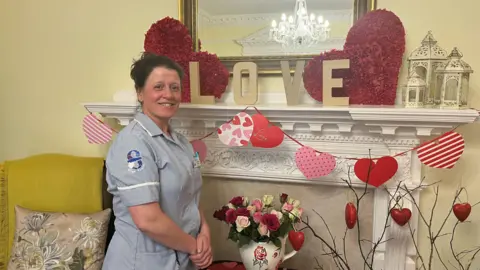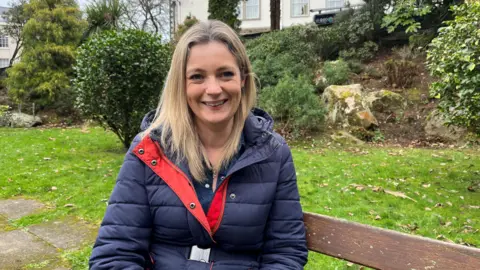Labour of love: Carers call for States support
 BBC
BBCProfessional and informal carers are calling for more government support to look after the elderly in Guernsey.
The States has estimated the demand for accessing long-term residential care will increase by 50% by 2038.
Charity Carers Guernsey said three in five people would have caring responsibilities for loved ones in their lifetime.
Employment and Social Security has put forward a policy letter about the future of care, which States members are due to vote on this week.
'A hard job'
Emilia Fernandes has been a carer for 21 years at Chateau du Village Nursing Home in St Peter Port.
While she said she "loved her job", she added that it was not easy and the States should do more to support people in her profession.
She said: "Being a carer is a hard job. For what we earn in an hour, and for what we do, we should have a little bit more support.
"My company looks after the staff very well and I can't complain, but I think the government should do more.
"A lot of carers in Guernsey are immigrants. The rent is so expensive that some carers have to work over 50 hours a week to pay it, and they need to visit home too.
"The families of the residents are so supportive. Your colour or where you come from doesn't matter - if you give your heart to what you do, you'll be happy."

The proposals which will be debated this week will focus on care provided by people such as Emilia in residential homes.
Ellie Lawrence, chair of Carers Guernsey, said while the work was vital the majority of care work remained "invisible" as many informal carers did not see what they did as work.
She said: "At the moment, we've got around 8,000 informal carers in the bailiwick who care for their loved ones.
"We would really like to see the provision of home care to support them with their responsibilities."
Carers Guernsey said it estimated three in five people, at some point in their lives, would have care-giving responsibilities.
The charity found three in five of those carers would also have a long-term physical or mental illness.
She said: "This pressure caring for somebody adds to their already fragile state.
"I'm grateful for ESS raising the issue in the States, but so much more needs to be done.
"We need to see care at home to support our informal carers, so elderly people can stay at home for as long as possible."
Care at home 'unaffordable'
Peter Roffey, President of Employment and Social Security, said he hoped staff would receive a more competitive salary after the government contributed more money to the care sector.
Asking islanders for higher tax contributions are a key part of his proposals.
He said: "We need a really large expansion in the care sector because we know there are going to be an awful lot more over-85s over the next few years.
"At the moment, the amount of income care homes are receiving is just not sufficient to stimulate the sort of expansion we need.
"So we need to be more realistic, we need to pay them more, and we have to find that money from somewhere."
On the issue of support for informal carers, Roffey said work had been done in recent years, but admitted "it is difficult".
He said: "It is one of our budgets that is growing very rapidly because of the changing demographics.
"I wish I could say we could have a real step change in support, but I personally doubt whether that's affordable."
Follow BBC Guernsey on X and Facebook. Send your story ideas to [email protected].
